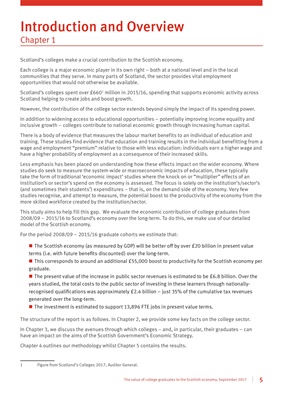
5
The value of college graduates to the Scottish economy, September 2017
Introduction and Overview
Chapter 1
Scotland's colleges make a crucial contribution to the Scottish economy.
Each college is a major economic player in its own right - both at a national level and in the local
communities that they serve. In many parts of Scotland, the sector provides vital employment
opportunities that would not otherwise be available.
Scotland's colleges spent over £6601 million in 2015/16, spending that supports economic activity across
Scotland helping to create jobs and boost growth.
However, the contribution of the college sector extends beyond simply the impact of its spending power.
In addition to widening access to educational opportunities - potentially improving income equality and
inclusive growth - colleges contribute to national economic growth through increasing human capital.
There is a body of evidence that measures the labour market benefits to an individual of education and
training. These studies find evidence that education and training results in the individual benefitting from a
wage and employment "premium" relative to those with less education: individuals earn a higher wage and
have a higher probability of employment as a consequence of their increased skills.
Less emphasis has been placed on understanding how these effects impact on the wider economy. Where
studies do seek to measure the system-wide or macroeconomic impacts of education, these typically
take the form of traditional 'economic impact' studies where the knock on or "multiplier" effects of an
institution's or sector's spend on the economy is assessed. The focus is solely on the institution's/sector's
(and sometimes their students') expenditures - that is, on the demand side of the economy. Very few
studies recognise, and attempt to measure, the potential boost to the productivity of the economy from the
more skilled workforce created by the institution/sector.
This study aims to help fill this gap. We evaluate the economic contribution of college graduates from
2008/09 - 2015/16 to Scotland's economy over the long-term. To do this, we make use of our detailed
model of the Scottish economy.
For the period 2008/09 - 2015/16 graduate cohorts we estimate that:
n The Scottish economy (as measured by GDP) will be better off by over £20 billion in present value
terms (i.e. with future benefits discounted) over the long-term.
n This corresponds to around an additional £55,000 boost to productivity for the Scottish economy per
graduate.
n The present value of the increase in public sector revenues is estimated to be £6.8 billion. Over the
years studied, the total costs to the public sector of investing in these learners through nationallyrecognised
qualifications was approximately £2.4 billion - just 35% of the cumulative tax revenues
generated over the long-term.
n The investment is estimated to support 13,896 FTE jobs in present value terms.
The structure of the report is as follows. In Chapter 2, we provide some key facts on the college sector.
In Chapter 3, we discuss the avenues through which colleges - and, in particular, their graduates - can
have an impact on the aims of the Scottish Government's Economic Strategy.
Chapter 4 outlines our methodology whilst Chapter 5 contains the results.
1 Figure from Scotland's Colleges 2017, Auditor General.